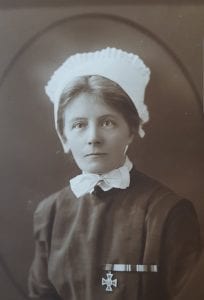
Biography
Susan Hall was born in Durkar, near Wakefield in Yorkshire, on the 1st February 1879[mfn]The National Archives: War Office 399/ 3461[/mfn] [mfn]1881 England Census RG11/ 4571/ 59/ p.21[/mfn]. Her father was a farmer[mfn]The National Archives: War Office 399/ 3461[/mfn].
She was educated at the Church School, Crigglestone[mfn]The National Archives: War Office 399/ 3461[/mfn]. The 1901 Census showed her working as a housemaid to Edwin Mackie in Wakefield[mfn]1901 England Census RG13/ 4284/ 10/ p.11[/mfn]. Between 1909 and 1913 she trained as a nurse at the Cumberland Infirmary[mfn]The National Archives: War Office 399/ 3461[/mfn]. She then worked at the Suffolk Hospital, Ipswich (1913-1914), the Plaistow Hospital, London (1914-1915) and the Friends Ambulance Unit [see note] based in Dunkirk (March-November 1915). She enrolled in the Queen Alexandra’s Imperial Military Nursing Service (Reserve) (QAIMNS(R)) on the 6th November 1915 and was posted directly to a unit in France[mfn]The National Archives: War Office 399/ 3461[/mfn].
Nursing Service in WW1
Susan Hall was accepted into the QAIMNS(R) as a Staff Nurse. She had a number of postings in the 4 years she remained an Army nurse[mfn]The National Archives: War Office 399/ 3461[/mfn]:
- On acceptance she was posted to 14 General Hospital;
- 23 November 1915 posted to HMHS Aberdonian;
- 9 October 1916 posted to 11 General Hospital;
- 3 June 1917 posted to 10 Casualty Clearing Station;
- 15 August 1917 posted to 44 Casualty Clearing Station;
- 21 August 1917 posted to 10 Stationary Hospital;
- 13 September 1917 posted to 10 Casualty Clearing Station;
- 19 March 1918 posted to 10 Stationary Hospital;
- 28 March 1918 posted to 10 Casualty Clearing Station;
- 1 April 1918 promoted to Acting Sister;
- 11 May 1918 posted to 10 Stationary Hospital;
- 25 May 1918 posted to 18 Casualty Clearing Station;
- 6 July 1918 posted to 10 Casualty Clearing Station;
- 2 November 1918 posted to 24 Casualty Clearing Station;
- 5 November 1918 posted to 10 Casualty Clearing Station;
- 28 March 1919 posted to Boulogne for demobilisation.
There are a number of reports in her records all of which are very positive[mfn]The National Archives: War Office 399/ 3461[/mfn]:
11 General Hospital:
“She has not had charge of a ward but would be quite capable of managing one … She is a most reliable & conscientious worker. Capable in every way.”
10 Casualty Clearing Station:
“… is a most reliable & conscientious nurse. Is very energetic.”
10 Casualty Clearing Station:
“… most excellent in all she undertakes, capable, thorough and reliable. Very observant & good tempered. Good in the training of orderlies.”
She was awarded the Associate Royal Red Cross, 31 December 1918[mfn]The London Gazette, Supplement, 31 December 1918 p.34[/mfn], and attended an investiture at Buckingham Palace on March 12th 1920[mfn]The British Journal of Nursing, March 20, 1920 p.171[/mfn].
After WW1
In 1922 she was appointed Home Sister of the Victoria Hospital, Blackpool
Miss Susan Hall, A.R.R.C., has been appointed Home Sister. She was trained at the Cumberland Infirmary, Carlisle, at the Monsall Fever Hospital, Manchester, at the City of London Maternity Hospital, and in housekeeping at the Hospital for Sick Children, Great Ormond Street, W.C. She has been Sister at the East Suffolk Hospital, Ipswich, and at the Plaistow Hospital, London, and worked abroad in connection with Queen Alexandra’s Imperial Military Nursing Service as Theatre Sister, and Night Sister. She has been Holiday Housekeeping Sister in the Hospital for Sick Children, Great Ormond Street. W.C.
In 1924 she was appointed Matron of the Victoria Hospital, Blackpool
“Miss Susan Hall, S.R.N., R.F.N., A.R.R.C., has been appointed Matron. She was trained at the ‘Cumberland Infirmary, Carlisle, and the Monsall Fever Hospital, Manchester, and has been Sister at the East Suffolk Hospital, Ipswich, and at the Plaistow Fever Hospital. She served in France during the war as a member of Queen Alexandra’s Imperial Military Nursing Service Reserve.”
note: The Quakers ran the Friends’ Ambulance Unit including the Queen Alexandra Hospital in Dunkirk for most of the duration of the First World War. One of its purposes was that members of the Society of Friends should be able to carry out their patriotic duty without having to serve in the Military on conscientious grounds. However, it also recruited from beyond the Quaker community. It was a small hospital of 200 beds and did not take in wounded, but local sick of all nationalities and any accident cases in the local area.